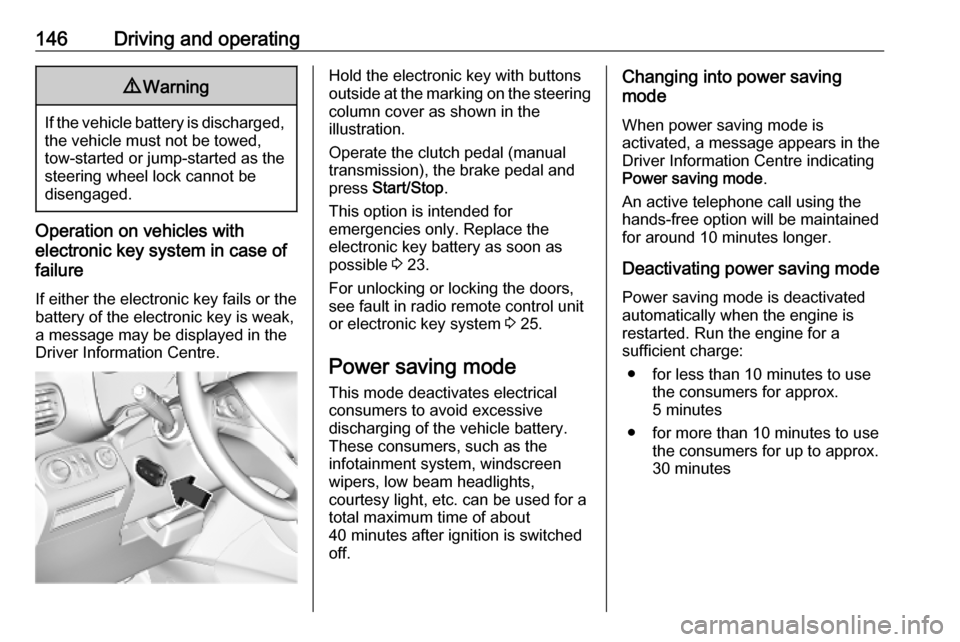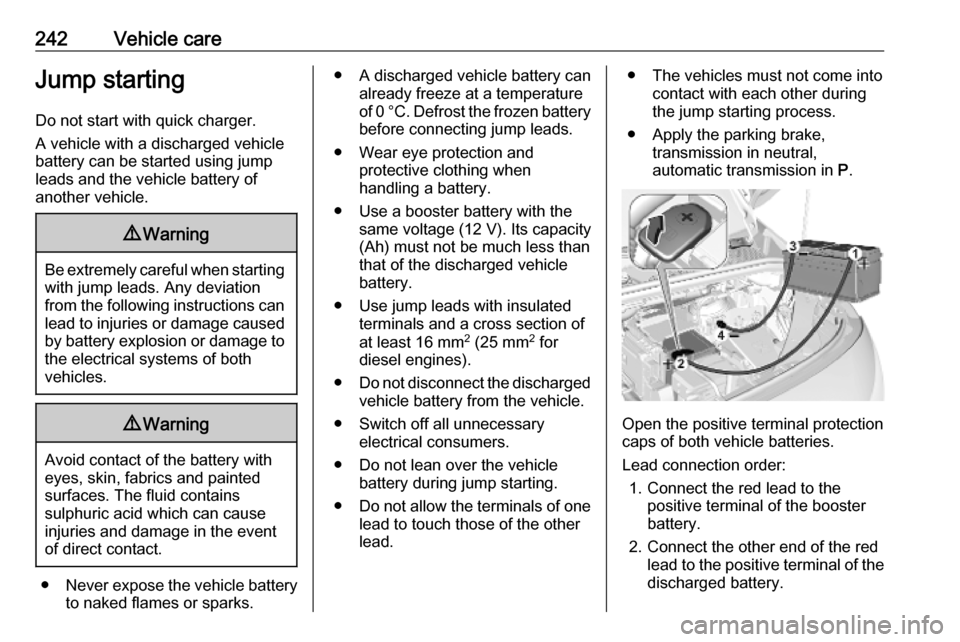jump start OPEL COMBO E 2019 Manual user
[x] Cancel search | Manufacturer: OPEL, Model Year: 2019, Model line: COMBO E, Model: OPEL COMBO E 2019Pages: 279, PDF Size: 10.43 MB
Page 148 of 279

146Driving and operating9Warning
If the vehicle battery is discharged,
the vehicle must not be towed,
tow-started or jump-started as the
steering wheel lock cannot be
disengaged.
Operation on vehicles with
electronic key system in case of
failure
If either the electronic key fails or the
battery of the electronic key is weak,
a message may be displayed in the
Driver Information Centre.
Hold the electronic key with buttons
outside at the marking on the steering column cover as shown in the
illustration.
Operate the clutch pedal (manual
transmission), the brake pedal and
press Start/Stop .
This option is intended for
emergencies only. Replace the
electronic key battery as soon as
possible 3 23.
For unlocking or locking the doors,
see fault in radio remote control unit
or electronic key system 3 25.
Power saving mode
This mode deactivates electrical
consumers to avoid excessive
discharging of the vehicle battery.
These consumers, such as the
infotainment system, windscreen
wipers, low beam headlights,
courtesy light, etc. can be used for a
total maximum time of about
40 minutes after ignition is switched
off.Changing into power saving
mode
When power saving mode is
activated, a message appears in the
Driver Information Centre indicating
Power saving mode .
An active telephone call using the
hands-free option will be maintained
for around 10 minutes longer.
Deactivating power saving mode
Power saving mode is deactivated
automatically when the engine is
restarted. Run the engine for a
sufficient charge:
● for less than 10 minutes to use the consumers for approx.
5 minutes
● for more than 10 minutes to use the consumers for up to approx.
30 minutes
Page 212 of 279

210Vehicle careVehicle careGeneral Information...................210
Accessories and vehicle modifications .......................... 210
Vehicle storage ........................211
End-of-life vehicle recovery .....212
Vehicle checks ........................... 212
Performing work ......................212
Bonnet ..................................... 212
Engine oil ................................. 213
Engine coolant ......................... 214
Washer fluid ............................ 215
Brakes ..................................... 215
Brake fluid ............................... 215
Vehicle battery ......................... 215
Diesel fuel system bleeding .....217
Wiper blade replacement ........217
Bulb replacement .......................218
Halogen headlights ..................218
LED headlights ........................ 220
Front fog lights ......................... 220
Front turn lights .......................221
Tail lights ................................. 222
Side turn lights ......................... 224
Number plate light ...................225
Interior lights ............................ 225Electrical system........................225
Fuses ....................................... 225
Engine compartment fuse box . 226
Instrument panel fuse box .......227
Vehicle tools .............................. 228
Tools ........................................ 228
Wheels and tyres .......................229
Winter tyres ............................. 229
Tyre designations ....................230
Tyre pressure .......................... 230
Tyre deflation detection system .................................... 231
Tread depth ............................. 232
Changing tyre and wheel size . 233
Wheel covers ........................... 233
Tyre chains .............................. 233
Tyre repair kit .......................... 234
Wheel changing .......................237
Spare wheel ............................ 238
Jump starting ............................. 242
Towing ....................................... 243
Towing the vehicle ...................243
Towing another vehicle ...........244
Appearance care .......................245
Exterior care ............................ 245
Interior care ............................. 247General Information
Accessories and vehiclemodifications
We recommend the use of genuine
parts and accessories and factory approved parts specific for your
vehicle type. We cannot assess or guarantee reliability of other products
- even if they have a regulatory or
otherwise granted approval.
Any modification, conversion or other changes made to standard vehicle
specifications (including, without
limitation, software modifications,
modifications of the electronic control
units) may invalidate the warranty
offered by Opel. Furthermore, such
changes may affect driver assistance
systems, may impact fuel
consumption, CO 2 emissions and
other emissions of the vehicle and
cause the vehicle to no longer
conform to the operating permit,
impacting the validity of your vehicle
registration.
Page 218 of 279

216Vehicle care
Batteries do not belong in household
waste. They must be disposed of at
an appropriate recycling collection
point.
Laying up the vehicle for more than
four weeks can lead to battery
discharge. Disconnect the clamp from the negative terminal of the vehicle
battery.
Ensure the ignition is switched off
before connecting or disconnecting
the vehicle battery.
Battery discharge protection 3 130.
Replacing the vehicle battery Note
Any deviation from the instructions
given in this section may lead to
temporary deactivation or
disturbance of the stop-start system.
When the vehicle battery is being
replaced, please ensure that there
are no open ventilation holes in the
vicinity of the positive terminal. If a
ventilation hole is open in this area, it
must be closed off with a dummy cap, and the ventilation in the vicinity of the negative terminal must be opened.
Ensure that the battery is always
replaced by the same type of battery.
The vehicle battery has to be
replaced by a workshop.
Stop-start system 3 148.
Charging the vehicle battery9 Warning
On vehicles with stop-start
system, ensure that the charging potential does not exceed 14.6 V
when using a battery charger.
Otherwise the vehicle battery may be damaged.
Jump starting 3 242.
Warning label
Meaning of symbols:
● No sparks, naked flames or smoking.
● Always shield eyes. Explosive gases can cause blindness or
injury.
● Keep the vehicle battery out of reach of children.
● The vehicle battery contains sulphuric acid which could cause
blindness or serious burn
injuries.
Page 244 of 279

242Vehicle careJump startingDo not start with quick charger.
A vehicle with a discharged vehicle
battery can be started using jump
leads and the vehicle battery of
another vehicle.9 Warning
Be extremely careful when starting
with jump leads. Any deviation
from the following instructions can
lead to injuries or damage caused
by battery explosion or damage to the electrical systems of both
vehicles.
9 Warning
Avoid contact of the battery with
eyes, skin, fabrics and painted
surfaces. The fluid contains
sulphuric acid which can cause
injuries and damage in the event
of direct contact.
● Never expose the vehicle battery
to naked flames or sparks.
● A discharged vehicle battery can already freeze at a temperature
of 0 °C. Defrost the frozen battery before connecting jump leads.
● Wear eye protection and protective clothing when
handling a battery.
● Use a booster battery with the same voltage (12 V). Its capacity
(Ah) must not be much less than
that of the discharged vehicle battery.
● Use jump leads with insulated terminals and a cross section of
at least 16 mm 2
(25 mm 2
for
diesel engines).
● Do not disconnect the discharged
vehicle battery from the vehicle.
● Switch off all unnecessary electrical consumers.
● Do not lean over the vehicle battery during jump starting.
● Do not allow the terminals of one
lead to touch those of the other
lead.● The vehicles must not come into contact with each other during
the jump starting process.
● Apply the parking brake, transmission in neutral,
automatic transmission in P.
Open the positive terminal protection
caps of both vehicle batteries.
Lead connection order: 1. Connect the red lead to the positive terminal of the booster
battery.
2. Connect the other end of the red lead to the positive terminal of the
discharged battery.
Page 245 of 279

Vehicle care2433. Connect the black lead to thenegative terminal of the booster
battery.
4. Connect the other end of the black
lead to a vehicle grounding point
of your vehicle in the engine
compartment.
Route the leads so that they cannot
catch on rotating parts in the engine
compartment.
To start the engine: 1. Start the engine of the vehicle providing the jump.
2. After five minutes, start the other engine. Start attempts should be
made for no longer than
15 seconds at an interval of one
minute.
3. Allow both engines to idle for approx. three minutes with the
leads connected.
4. Switch on electrical consumers e.g. headlights, heated rear
window of the vehicle receiving
the jump start.
5. Reverse above sequence exactly when removing leads.Towing
Towing the vehicle
Wrap a cloth around the tip of a flat
screwdriver, for example, to prevent
paint damage. Insert the screwdriverin the slot at the lower part of the cap.
Release the cap carefully.
The towing eye is stowed with the vehicle tools 3 228.
Screw in the towing eye as far as it will
go until it stops in a horizontal
position.
Attach a tow rope – or better still a tow
rod – to the towing eye.
The towing eye must only be used for
towing and not for recovering the
vehicle.
Switch on ignition to release steering
wheel lock and to permit operation of
brake lights, horn and windscreen
wiper.
Page 276 of 279

274GGauges ....................................... 100
Gear shifting ............................... 107
General information ...................205
Glass panel .................................. 45
Glovebox ..................................... 71
Glovebox cooler ......................... 141
H Halogen headlights ....................218
Hand brake ................................. 161
Hazard warning flashers ............125
Headlight flash ........................... 124
Headlight range adjustment ......124
Headlights................................... 122 Headlights when driving abroad 125
Head restraint adjustment .............8
Head restraints ............................ 46
Head-up display.......................... 116
Heated mirrors ............................. 39
Heated rear window ..................... 43
Heated steering wheel .................90
Heated windscreen .......................43
Heating ........................................ 51
Heating and ventilation system . 131
High beam ......................... 110, 123
High beam assist ................110, 123
Hill start assist ........................... 164
Horn ....................................... 14, 91I
Identification plate .....................254
Ignition switch positions .............144
Immobiliser .................................. 38
Indicators .................................... 100
Inductive charging ........................96
Info Display ................................. 114
Installing seats .............................. 53
Instrument cluster ........................98
Instrument panel fuse box .........227
Instrument panel illumination control .................................... 127
Instrument panel overview ........... 10
Interior care ............................... 247
Interior lighting ............................ 127
Interior lights ...................... 128, 225
Interior mirrors .............................. 40
Introduction .................................... 3
J
Jump starting ............................. 242
K Keys ............................................. 21
Keys, locks ................................... 21
L Ladder flap.................................... 76
Lane keep assist ................108, 198
Lashing eyes ............................... 80
LED headlights ...................110, 220Lighting features .........................129
Light switch ................................ 122
Load compartment ................33, 76
Load compartment cover .............77
Load compartment grille ...............83
Loading ............................. 49, 52, 53
Loading information .....................87
Low beam ................................... 110
Low fuel ..................................... 109
M
Malfunction indicator light ..........106
Manual anti-dazzle ......................40
Manual mode ............................. 157
Manual transmission .................. 159
Mirror adjustment ........................... 8
Misted light covers .....................127
N New vehicle running-in ..............144
Number plate light .....................225
O Object detection systems ...........185
Odometer ................................... 101
Oil, engine .......................... 252, 256
Outside temperature ....................93
Overcab storage ..........................75
Overhead console .......................73
Overrun cut-off ........................... 148